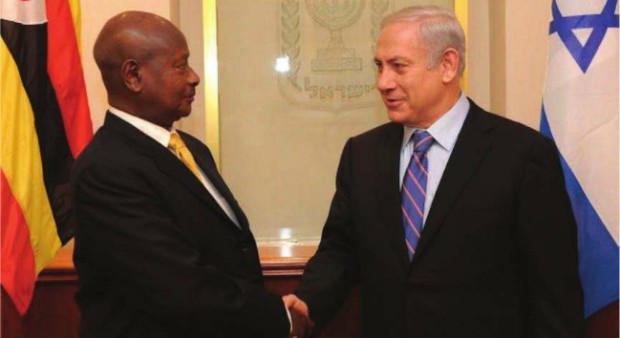By Ronald Musoke
Israeli Prime Minister Benjamin Netanyahu’s visit to Uganda has not yet been confirmed by the Ministry of Foreign Affairs in Kampala but already interest in it has peaked.

It started rising almost as soon as Netanyahu was quoted by The Jerusalem Post as saying on Feb.29 that he had received an invitation from President Uhuru Kenyatta of Uganda’s neighbour, Kenya, to visit the region.
Netanyahu said he intended to do so around the 40th anniversary of the famous raid on Entebbe International Airport by Israeli commandos to rescue hostages from the Popular Front for the Liberation of Palestine (PFLP). Netanyahu’s brother, Lt. Col. Yonatan Netanyahu, commanded that July 4, 1976 attack and was the only Israeli soldier killed. Netanyahu reportedly told the new caucus on Israel-Africa ties in the Israeli Parliament, the Knesset, that the attack “was a dramatic national event with great personal consequences for me.”
People close to Netanyahu say it has always been his desire to officially visit Uganda, especially Entebbe Airport; the spot where his brother was killed.
If this sequence of events and conjectures leads to an eventual visit to Uganda, it will most likely happen sometime in July.
Henry Oryem Okello, the minister of state for foreign affairs told The Independent on March 15 that there is no official preparation for Netanyahu’s visit at the moment because Uganda has not yet received any official communication from Tel Aviv. He added, however, that “if he chooses to visit this year, we will be more than prepared to host him”.
In any case, talk of the Netanyahu visit has shone a new spot-light on the sometimes secret dealings between Uganda and Israel.
In the recent past, there have been several international reports that Uganda has accepted unwanted African immigrants from Israel in what many have dubbed an exchange for arms and military training for Ugandan officers in Israel.
When asked to comment, Minister Okello denied the allegations.
“That is not true because I have made my research including cross-checking with my counterpart in Tel Aviv,”he told The Independent, “The response is that there is no such a deal between the two states.”
The reality, however, is that relations between Israel and Uganda are at a new high.
President Yoweri Museveni has visited Israel several times and so has the First Lady. Israel is already one of the major contributors to Uganda’s national security and intelligence arming and training.
Political and economic ties between the two countries have also grown and Israeli companies are heavily investing in Uganda. They are now heavily involved in agriculture, water management, health, and security. Israeli companies are also active in infrastructural development and the services industry in Uganda.
Okello told The Independent that Israel hosts up to 200 Ugandan undergraduate agriculture students every year to work on the Kibbutz (Israeli communal farms) as they attend classes. They earn money and upon graduation return to Uganda with modern agricultural skills.
Balton International is one of the Israeli companies in Uganda that is involved in agriculture.
The Israel agency for international cooperation (Mashav) is also involved in training programmes in Uganda – making it the third country in Africa, after Ethiopia and Rwanda to have Israel training for diplomatic staff.
Perhaps the most visible Israeli firm working in Uganda is Solel Boneh International (SBI) which is involved in construction. It has a long history in the country but returned in 2003 and has been strong in constructing some of Uganda’s modern highways.
Today SBI is implementing several turn-key projects including construction of major highways [Kampala- Masaka, Malaba/Busia-Bugiri, Mbarara-Ntungamo, Ntungamo-Kabale-Katuna and Mukono-Katosi and Kayunga-Njeru]. SBI is also working on the 3000 housing unit project at Lubowa, just outside Kampala.
SBI also built Entebbe International Airport and inadvertently played a key role in 1976 by providing blue prints of the airport to its government for the rescue mission.
Mutual benefit or opportunism
Looking at these projects, Jadaliyya, an online publication for the Arab Studies Institute describes Israel’s relations with Uganda over the past six decades as being that of “mutual opportunism.”
That phrase is also used by Mwambutsya Ndebesa who teaches history and development studies at Makerere University in Kampala when describing the Israel-Uganda relationship. He says although Uganda is considered one of the African states friendly to Israel, it often takes a pragmatic and balanced approach because of its position on the Arab-Israeli conflict.
“You could call it ‘diplomatic opportunism’ because in some respects, it is neither here nor there,”Ndebesa told The Independent.
Former Israeli ambassador to Uganda Aryeh Oded who represented Israel at the signing of the agreement to resume diplomatic relations in 1994 in Kampala said Museveni had years earlier been reluctant to renew relations with Israel while Palestinians remained ‘homeless.’ Museveni’s attitude only softened after Israel signed the Oslo Accords in 1993 with the PLO that were designed to offer the Palestinians a state of self-determination.
Oded made the explanation to another professor, Steven Carol, who wrote a book titled `From Jerusalem to the Lion of Judah and Beyond; Israel’s foreign policy in East Africa’.
Ndebesa says Israel’s cultivation of relations with countries like Uganda was because they wanted to weaken the Arab world through Uganda.
Ndebesa also delves into history to make sense of Netanyahu’s anticipated visit to Uganda. He says the ties between the two states seem to come from “a historical coincidence.”
He mentions that before the state of Israel was created in 1948, Uganda had been considered as a possible home of the Jews in a scheme dubbed the ‘Uganda Programme’ of 1903.
But Theodor Herzl—the father of modern political Zionism – meaning the belief that Israel is meant for Jews, rejected the idea in preference for the ancient homeland in Palestine. Prof. Carol noted that from the moment Israel was established in 1948, the small state started looking for political allies in the international community to help it break the clutch of hostile Arab countries. According to Oded, Uganda’s attractiveness to Israel was in part a result of its location next to civil war-stricken Sudan.
Israel’s looking out to Africa and East Africa in particular, was a way of achieving this goal through ensuring that Arab states are cut off from international aid. In return, it would offer cooperating nations like Uganda technological and economic assistance.
In a separate interview with the Canadian broadsheet, The Globe and Mail, another professor, Galia Sabar, the chair of African Studies at Tel Aviv University said in 2013 that given the East African region’s strategic location, it was too important for Israel to ignore.
A different perspective, this time from Prof. Morris Ogenga Latigo, a former Leader of the Opposition in Uganda’s parliament and MP-elect for Agago North, is that in the 1960s, Israel particularly saw Uganda as a potential strategic country she would use to play against Egypt particularly in respect to the Nile waters. Whatever its motivation, Israel moved fast to implement it.
On October 09, 1962, when Uganda became independent, Yigal Allon, then-Israeli Minister of Labour ensured he was in Kampala to attend the celebrations and in February 1963, Israeli foreign minister, Golda Meir, visited Uganda and promptly signed a technical cooperation agreement. This cooperation programme has been credited with helping to ‘Africanise’ Uganda’s public administration. It was also involved in training local government officials such as treasurers and secretaries, tax officials and even hotel managers. But Israel’s biggest mark on Ugandan society was done in the field of civil engineering where several Israeli firms initiated several projects which still stand tall up to now.
Sour relations begin
Then, at the beginning of the 1970s relations between the two countries suddenly went sour after then-President Milton Obote developed very warm relations with Sudan’s Jafaar Nimeiry.
“Nimeiry and Obote were both Socialists and Pan-Africanist and the spirit was high and it was in solidarity with the Arab world,” says Ndebesa.
This explains why some observers of the relations between the two states, say Israel played an important role in supporting the Israel trained Gen. Idi Amin to topple Obote in a military coup in 1971.
In fact, Amin’s first visit to a foreign country after his coup was to Israel. But that friendship was short-lived.
After the expulsion of Asians in 1972, Uganda got isolated by the West and within a year; relations between Israel and Uganda would sour following Israel’s shutting of her aid tap.
“Amin became desperate and turned to Arab countries for aid. He even enlisted Uganda to become a member of the Organisation of Islamic Cooperation even though the majority of the population was and still remains Christian,” Ndebesa says.
Some political observers say it was only after this that former Libyan leader, the late Muammar Gadaffi met Amin in Tripoli and promised Uganda aid, but on one condition: that Amin severs ties with Israel.
Amin suddenly expressed his support for the Arab struggle against Zionism, cancelled all military hardware contracts with Israel, and demanded that all Israelis leave Uganda immediately.
By March, 1972, Amin had closed the Israeli Embassy in Uganda and severed all diplomatic relations. He in turn invited the Palestinian Liberation Organisation (PLO) representative to take over the residence of the former Israeli Ambassador.
The PLO would also go ahead and establish their military training camps in Uganda. Having a PLO base in Kampala probably played a major role in the Entebbe hostage crisis of mid-1976.
Israel-Uganda relations revival
As he prepares for his Africa tour-cum-pilgrimage, observers who have followed Netanyahu’s political career agree with him when he says that the dramatic Entebbe raid had personal consequences for him.
“It is a very important part of Israeli history and every single Israeli child is told about it and grows knowing that such an event should never happen again,” Okello says. He also points at Israel’s very good relationship with Uganda.
“Israel has always had a special eye for Uganda,” he says and denies any ‘mutual opportunism’ talk.
But Ogenga Latigo says if you compare the relationship between Uganda and Israel in the 1960s with that of today, the ‘mutual opportunism’description could be true.
“For Museveni’s government, such relations are normally strategic and basically about security and it is not always mutual interest but opportunism.
“Museveni knows the Israeli intelligence system is excellent and so he courts them to provide the necessary help to Uganda.”
 The Independent Uganda: You get the Truth we Pay the Price
The Independent Uganda: You get the Truth we Pay the Price


